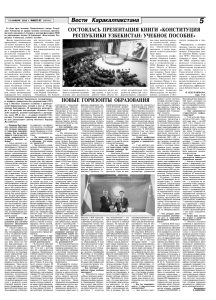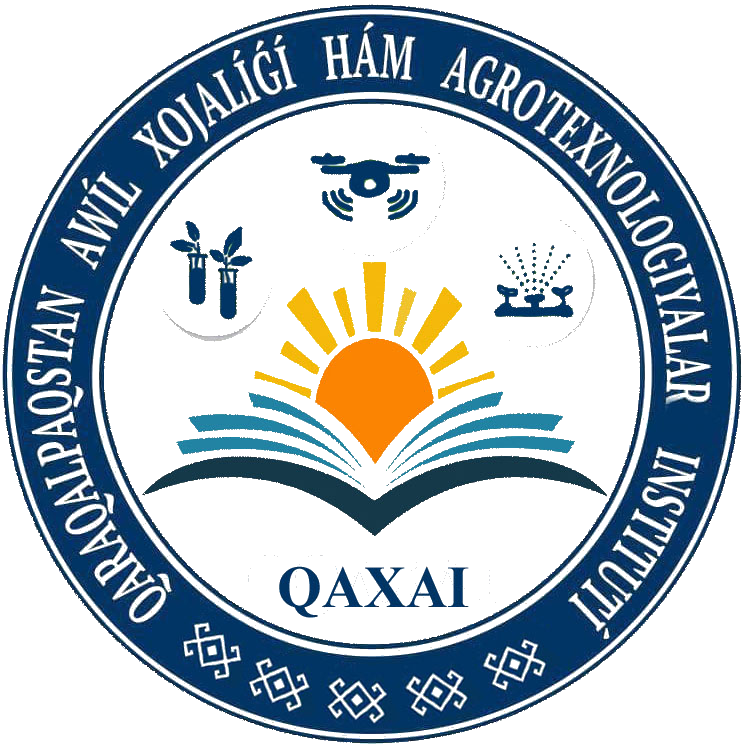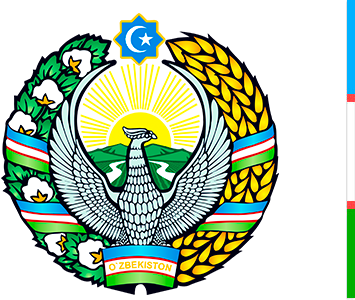New horizons of education at the Karakalpak Institute of Agriculture and Agrotechnologies A detailed article about the activities and development strategy of the rector of the Karakalpak Institute of Agriculture and Agrotechnologies, Berdiyar Zhollibekov, was published in the November 2025 issue of the newspaper “Vestnik Karakalpakstana.”
The material extensively covers the achievements of the institute in a short period of time, innovative changes in educational and scientific processes, international cooperation, and work on the development of youth potential.
During the interview, Rector Berdiyar Zhollibekov spoke about modern reforms in the education system, digitalization, integration of science and production, expansion of international relations, and the quality of personnel training.
He emphasized that the main goal of the institute is to train modern, competitive specialists with practical skills, combining the fields of science, innovation, and production. Information was also provided on the conditions created for young scientists and students, international internships, joint educational programs, and startup projects.
The article also highlights the “Green Campus” program, digital laboratories, educational and scientific projects in international cooperation, and the large-scale reforms being implemented at the institute to create a healthy educational environment.
This publication is a great recognition for the institute’s staff and plays an important role in introducing the results achieved in the field of education and science to the general public.
– An article from the November 2025 issue of the newspaper “Vestnik Karakalpakstana,” in which an interview with the rector of the Karakalpak Institute of Agriculture and Agrotechnologies, Berdiyar Zhollibekov, and the activities of the institute are highlighted. Below is the first part (title and main content) of the full translation of this article into Uzbek. If you’re interested, I can translate the rest as well.
NEW HORIZONS OF EDUCATION
Interview with the Rector of the Karakalpak Institute of Agriculture and Agrotechnologies Berdiyar Zhollibekov
– Berdiyar Bakhtiyorovich, today the higher education system is undergoing serious changes. How do you define the institution’s development strategy in the context of rapid reforms?
– A very relevant question. Indeed, higher education in Uzbekistan is undergoing large-scale reforms: internationalization, digitalization, transition to competency-based educational models, integration of science and business, increasing the autonomy and competitiveness of universities.
Our strategy is not a simple plan – it is a “compass,” that is, a direction that shows the way to keep up with the times. The most important aspect for us is the quality of personnel training, and we are implementing educational programs based on international standards. Our goal is to train graduates as specialists who can quickly adapt to the market, work here and now.
The second priority is the integration of science, education, and industry. Without scientific research, a modern university loses its dynamism. International cooperation, the exchange of experience, and ties that stimulate the development of innovations are also very important for us.
– In your opinion, what is the biggest challenge (problem) for the higher education system of Karakalpakstan?
The main problem is the gap between the knowledge taught in education and the needs of the real economy. The world is changing, therefore education must also be flexible. Another important aspect is the need for digitalization. Today’s generation thinks completely differently, so we need to create a modern digital environment for them.
The issue of teacher training is also relevant: it is necessary to constantly improve their qualifications. In our region, there are specific conditions related to socio-economic, environmental, and personnel potential. Therefore, an approach that meets local conditions is necessary for the development of each university. Our main task is to transform the university into a center of innovation and human capital, which will contribute to the restoration of the Aral Sea region.
Should I continue the translation in full this way (there are about 5 pages of interviews in the article)?

 (+99861) 229-27-01
(+99861) 229-27-01

 qaxai_info@tdaunukus.uz
qaxai_info@tdaunukus.uz




















